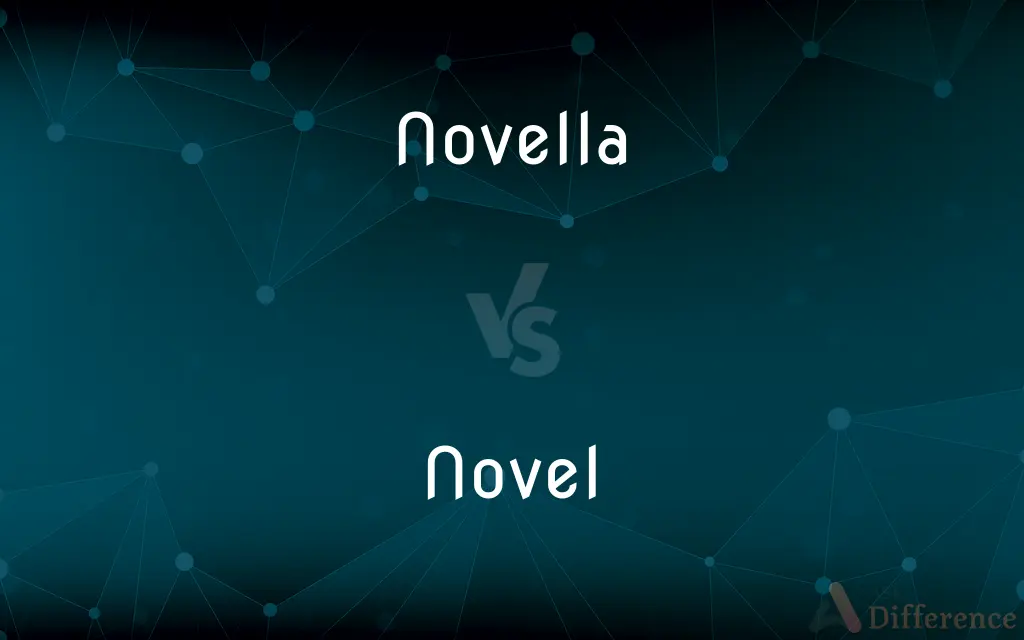Novella vs. Novel — What's the Difference?
By Tayyaba Rehman — Updated on September 15, 2023
A novella is a shorter work of fiction that typically ranges from 20,000 to 50,000 words and often explores a single idea or theme. A novel is a longer work of fiction, usually over 50,000 words, that delves into complex characters and multiple themes.

Difference Between Novella and Novel
Table of Contents
ADVERTISEMENT
Key Differences
A novella is a form of written, fictional narrative that sits between a short story and a novel in terms of length and complexity. Generally ranging from about 20,000 to 50,000 words, a novella often focuses on a singular theme, event, or character. A novel, in contrast, is a longer form of fiction, usually extending over 50,000 words, and offers a more expansive exploration of themes, characters, and settings.
Both novellas and novels aim to provide a compelling story but do so in different scopes. Novellas are more focused and concise, usually concentrating on a single issue or conflict. Novels, meanwhile, have the room to delve into subplots, a wider range of characters, and varied settings. The complexity of novels often allows for greater character development and thematic depth.
In terms of structure, novellas often lack the multiple subplots, twists, and turns commonly found in novels. They might not even be broken into chapters, instead presenting a continuous, uninterrupted narrative. Novels are generally structured into chapters and may even be divided into parts or volumes to help manage their complexity.
Grammatically, both "novella" and "novel" serve as nouns, but their adjectival forms differ. "Novel" can also serve as an adjective meaning "new" or "unusual," while "novella" does not have a commonly used adjectival form. Both terms can be made plural, with "novellas" and "novels" being the respective plural forms.
Comparison Chart
Length
20,000 to 50,000 words
Usually over 50,000 words
ADVERTISEMENT
Focus
Single theme, event, or character
Multiple themes, characters, and settings
Structure
May lack chapters and subplots
Typically has chapters, subplots, and complex structures
Grammatical Role
Primarily used as a noun
Used as a noun and can be an adjective ("novel idea")
Complexity
Generally simpler
Generally more complex
Compare with Definitions
Novella
A work of fiction concentrating on a singular conflict.
The novella revolved around the hero's moral dilemma.
Novel
A long fictional narrative with complex characters and plot.
The novel spanned generations of a family's history.
Novella
A literary work between a short story and a novel in length.
His novella was too long to be a short story but too short to be a novel.
Novel
A detailed exploration of themes through storytelling.
The novel delved into themes of justice and equality.
Novella
A short fictional narrative focusing on a single theme.
The novella explored the complexities of love in a small town.
Novel
A literary work usually over 50,000 words.
His latest novel is a 300-page thriller.
Novella
A fictional story usually without chapters.
The novella was written as a continuous, flowing narrative.
Novel
A multi-layered, often segmented narrative.
The novel was divided into three parts, each from a different character's perspective.
Novella
A concise, often poignant narrative.
Her novella was a touching portrayal of friendship.
Novel
A novel is a relatively long work of narrative fiction, typically written in prose and published as a book. The present English word for a long work of prose fiction derives from the Italian: novella for "new", "news", or "short story of something new", itself from the Latin: novella, a singular noun use of the neuter plural of novellus, diminutive of novus, meaning "new".Some novelists, including Nathaniel Hawthorne, Herman Melville, Ann Radcliffe, John Cowper Powys, preferred the term "romance" to describe their novels.
Novella
A novella is a short novel, that is, a narrative prose fiction whose length is shorter than that of most novels, but longer than most short stories. No official definition exists regarding the number of pages or words necessary for a story to be considered a novella or a novel.
Novel
A fictional prose narrative of considerable length, typically having a plot that is unfolded by the actions, speech, and thoughts of the characters.
Novella
A short prose tale often characterized by moral teaching or satire.
Novel
The literary genre represented by novels.
Novella
A short novel.
Novel
Strikingly new, unusual, or different.
Novella
A short novel or long short story.
Novel
Newly made, formed or evolved; having no precedent; of recent origin; new.
Novella
(historical) novel
Novel
Original, especially in an interesting way; new and striking; not of the typical or ordinary type.
Novella
A short novel
Novel
A work of prose fiction, longer than a novella.
Novel
(historical) A fable; a short tale, especially one of many making up a larger work.
Novel
(obsolete) A novelty; something new.
Novel
A new legal constitution in ancient Rome.
Novel
Of recent origin or introduction; not ancient; new; hence, out of the ordinary course; unusual; strange; surprising.
Novel
That which is new or unusual; a novelty.
Novel
News; fresh tidings.
Some came of curiosity to hear some novels.
Novel
A fictitious tale or narrative, longer than a short story, having some degree of complexity and development of characters; it is usually organized as a time sequence of events, and is commonly intended to exhibit the operation of the passions, and often of love.
Novel
A extended fictional work in prose; usually in the form of a story
Novel
A printed and bound book that is an extended work of fiction;
His bookcases were filled with nothing but novels
He burned all the novels
Novel
Of a kind not seen before;
The computer produced a completely novel proof of a well-known theorem
Novel
Pleasantly novel or different;
Common sense of a most refreshing sort
Novel
A story with multiple subplots and varied settings.
The novel weaved together multiple characters' lives.
Common Curiosities
What is a Novel?
A novel is a longer work of fiction, generally over 50,000 words, exploring multiple themes, characters, and settings.
How long is a Novella?
A novella typically ranges from 20,000 to 50,000 words.
How long is a Novel?
A novel usually exceeds 50,000 words.
What is the focus of a Novella?
A novella generally focuses on a single theme, character, or event.
Can 'Novel' be an adjective?
Yes, 'novel' can also serve as an adjective meaning "new" or "unusual."
Is a Novel more complex than a Novella?
Generally, yes. Novels often have a higher level of complexity in characters, themes, and structure.
What is the focus of a Novel?
A novel has a broader focus, often including multiple themes, characters, and settings.
What is the plural form of Novella?
The plural form is "novellas."
What is a Novella?
A novella is a shorter work of fiction, usually between 20,000 to 50,000 words, focusing on a single theme or event.
Do Novels have chapters?
Novels usually have chapters to structure their more complex narratives.
Is a Novella quicker to read than a Novel?
Typically, yes, due to its shorter length and simpler structure.
What is the plural form of Novel?
The plural form is "novels."
Do Novellas have chapters?
Novellas may or may not have chapters; they often present a continuous narrative.
Is a Novella simpler than a Novel?
Generally, yes. Novellas are often simpler in terms of structure and themes.
Can 'Novella' be an adjective?
'Novella' is not commonly used as an adjective.
Share Your Discovery

Previous Comparison
Emo vs. Punk
Next Comparison
Jailbreak vs. UnlockAuthor Spotlight
Written by
Tayyaba RehmanTayyaba Rehman is a distinguished writer, currently serving as a primary contributor to askdifference.com. As a researcher in semantics and etymology, Tayyaba's passion for the complexity of languages and their distinctions has found a perfect home on the platform. Tayyaba delves into the intricacies of language, distinguishing between commonly confused words and phrases, thereby providing clarity for readers worldwide.















































